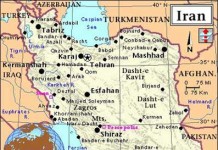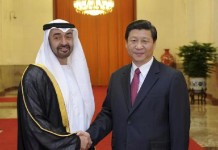Context
 In the last few days, a number of scenarios are being discussed in the media that could play out in Pakistan, as a result of the present civil-military tensions. Generally, the analyses of the local variables impacting the situation have been mostly on the spot. However, the external factors connected with the regional and global context that also impacts the assessment, have been glaringly missing. Obviously, any realistic estimate needs to take in to account the influence of the internal and the external factors. Consider this for an example; although the Memogate scandal has become the source of inter-institutional tensions with in Pakistan, its origin is tied to the direction and control of the nations foreign policy.
In the last few days, a number of scenarios are being discussed in the media that could play out in Pakistan, as a result of the present civil-military tensions. Generally, the analyses of the local variables impacting the situation have been mostly on the spot. However, the external factors connected with the regional and global context that also impacts the assessment, have been glaringly missing. Obviously, any realistic estimate needs to take in to account the influence of the internal and the external factors. Consider this for an example; although the Memogate scandal has become the source of inter-institutional tensions with in Pakistan, its origin is tied to the direction and control of the nations foreign policy.
Analysis
Significant developments are occurring in the neighborhood of Pakistan that will have a sturdy impact on the political, economic and security situation of the country. The Afghan reconciliation process and events related to Iran are two such developments. Iran has especially received the least amount of coverage in the Pakistani media. Furthermore, the 5-day visit of General Kiyani to China also got scant attention: particularly when it took place in the aftermath of the NATO Mohmand attack and the newly unveiled US defense strategy that emphasizes a shift towards the Asia Pacific.
On the last night of 2011, US signed some of the toughest sanctions to date in a bid to coerce Iran into abandoning its nuclear program. The sanctions have wide-reaching impact as they target Iran’s crucial oil sector, and the financial institutions of any country doing business with Iran’s Central Bank. Additionally, financial institutions that do business with the Iranian Central Bank will be barred from operations in the US. This has led to a scramble by countries around the globe that import Iranian oil, to either find an alternative oil supplier, or negotiate with Washington for a waiver from the sanctions. In retaliation, Iran has threatened to close the vital oil lane of the Strait of Hormuz.
For most countries that import oil from Iran, the threat of being excluded from the US market is too great to ignore. Nonetheless, China has been enraged by the unilateral US decision which it says places US domestic law above international law, and is coercive and impinges on the free functioning of foreign and trade relations of other nations. India is said to be applying for a waiver from the US, although Indian efforts to reduce reliance on Iranian oil began last year after India had trouble finding a payment mechanism for trade with Iran. It should be noted that in addition to concerns over the security situation of Pakistan, the American pressure also played a role in convincing India to drop out from the IPI gas pipeline project.
Pakistan’s response to the brewing Iran crisis came from its foreign minister, Hina Rabbani Khar. She stated that neither UN nor US sanctions on Iran will affect its deal of importing gas and added that, ‘Pakistan is bound to accept UN sanctions but has not accepted any pressure in this connection’. She clarified that a variety of sanctions have been imposed by UN, US and European Union and that the import of gas does not fall under the UN sanctions. Moreover, Pakistan is suffering from acute gas shortage and will utilize all option to meet its needs, she added.
The fact is that these sanctions will complicate Pakistan-Iran and Pakistan-US relations. The shortage of energy resources in Pakistan is already stimulating domestic turmoil and impeding economic activity. The real question is will Pakistan also ultimately need a waiver from the US. There is also talk that Pakistan might leverage the blocked NATO Afghan supply line to get an Iranian waiver. Turkey is using a similar tactic; it has claimed an exemption from the sanctions based on being a negotiator between the West and Iran.
In recent weeks, insurgent activity has also increased near the Pakistan-Iran border. Since November, Pakistan’s security forces have suffered two serious attacks near the Iranian border. These ambushes were attributed to the Baloch insurgency and in each incident up to 15 FC personnel were killed. Pakistani authorities have blamed sectarianism as well as an Afghan role for disturbances in Balochistan, and have lately not accused India.
In the aftermath of the downing of RQ 170 US stealth drone near its border with Afghanistan, Iran this week launched a military maneuver ‘Martyrs of Unity’ near Khvat, located 60 km (40 miles) from its border with Afghanistan. Commander of the Revolutionary Guards’ ground forces Mohammad Pakpour stated, “the exercise was aimed at boosting security along the Iranian borders.”
If war does breakout in the Persian Gulf, the Saudis and the US are likely to be on the same side while the Chinese and the Russian interests are intertwined with Iran. This complicates Pakistan’s position as it has traditionally been close to the gulf monarchies and the US. In the recent sectarian tensions in Bahrain that caused GCC forces to intervene, Pakistan’s military reportedly also helped out. During the just concluded visit of Gen Kiyani to China, the discussions are likely to have included the emerging regional situation related to Afghanistan, Iran and the Arab Spring.
In the aftermath of US Iran oil sanctions, China’s premier Wen Jiabao is heading to the Gulf counties of Saudi Arabia, United Arab Emirates and Qatar from January 14 -19. Wen Jiabao’s visit will be the first by a Chinese premier to Saudi Arabia in 20 years. During his visit, he is expected to discuss the Arab Spring with the leaders of these countries. “China hopes the independence, sovereignty and territorial integrity of these countries will be respected by the international community,” China’s deputy foreign minister Zhai Jun said. It is clear that the main worry for China, and for other emerging powers, is that the instability in the Middle East does not lead to any disruption of their energy supplies, needed to continue their growth.
All major world powers are closely monitoring the situation in the Middle East and interpreting what it means for them. On the other hand, Pakistan appears to be myopically focused on its internal politics, perhaps not realizing that the local politics is ultimately impacted by the external dynamics. And, how the country adapts to these regional and global influences may, in fact, play a more decisive role in shaping the nations future. While Pakistan’s civilian government may need US and western support to survive politically, the nation’s security and defense policies are drifting away from the US. On the other hand, as the US and NATO relations have deteriorated with Pakistan’s military, it needs the help of the unpopular civilian government.
As the transition in the global balance of power fully plays out, many skirmishes are likely to break out locally. Resisting or ignoring these external forces of change can be futile; the best strategy is first to visualize how they are likely to unfold and then to manage them.



